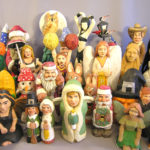What Does ‘Write What You Know’ Really Mean?
Write From Your Knowledge, Vague Or Otherwise
I am working on book 3 in the Santa Keeper series (Elsie’s Secret Life). This story will take place in the early 1960s. I have spent long hours online and in the library studying the people of the era. I’ve also interviewed people who remember what life was like in the 1960s.
The book starts out in 1963 in Chicago. I’ve researched Chicago maps, buildings, famous landmarks, and transportation from that year. I’ve also learned about hair and clothing styles, food and the book publishing industry where my story will focus on. Then there are well-known people of 1963 like President John Kennedy and his wife, Jacqueline and how they lived. I may decide to add those people. And since there will be a murder investigation, I will need to understand law enforcement procedures.
The major character will contract the Alzheimer’s disease that will impact the family. There are references to mystical, magical and enchanted objects. All this raps around a treasure hunt complete with clues and red herrings.
The Topics are Wide and Varying
“First, it starts with a trigger, something that causes an initial connection between the customer and with your brand. This “trigger” creates a projection of your company narrative which in turn creates a “memory” for your customer. At this point, you’ll either induce some sort of good feeling for your customer, or they’ll forget about you. People don’t remember what you told them, they remember how you made them feel. If you can’t make your customer feel strongly about your brand it’s highly unlikely they will remember you and move on.” More…
This brings me back to the writer’s advice – ‘write what you know.’ I have a vague knowledge of these topics I will write. But then I realized I had a lot to learn. After research, I ‘know’ more about these subjects.
‘Write what you know’ isn’t about writing with the knowledge you have. It’s about relating your personal life experiences in your writing to create an emotional response in the reader. Can you describe and convey the emotions you have experienced? Can you write about sadness, fear, anger, and the other emotions?
Elsie will experience excitement and elation when her dream of becoming a published writer is within her grasp. She becomes shocked and fearful when someone she knows becomes murdered. She experiences confusion and isolation, love and passion, temptation and rejection and overwhelming sadness.
Research for this book meant digging up facts and figure. I also dug into my own emotional well to pull out and share my life experiences and emotions. That is the most exhausting research of all. By the day I have exhausted my brain.
More on Writing What We Know
You Are a Writer (So Start Acting Like One)
Should We Only “Write What We Know
Write What You Know — Because You Know More than You Think!
“Write what you know” – the most misunderstood piece of good advice, ever. – write-what-you-know-nil-the-most-misunderstood-piece-of-good-advice-ever.
A book in itself is unlikely to make or break you, but it is a powerful extension of your business or blog. More…
Tell everyone about your stories. More…
Need more help brainstorm the character traits in your story? More…
Don’t forget to edit your character’s story. Do you use too many adverbs? Are you using the right words to describe them? More …
Start Writing Now – This book is for the dreamers who say one day they will write their stories and become a writer. Then they forget their dreams of writing. But they can write now – write those stories now. I mean right now.
How Not To Write A One Star Novel – Do you want to create a five star novel? Learn from other writers’ mistakes and prevent yourself from receiving any one star reviews for you hard work. Here is your free e-book.





Leave a Reply
Want to join the discussion?Feel free to contribute!